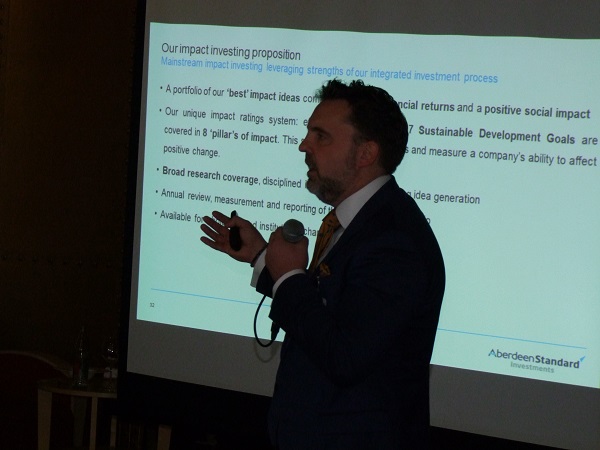 Ross McSkimming, Aberdeen Standard Investments;
Ross McSkimming, Aberdeen Standard Investments;
On Wednesday, Aberdeen Standard Investments held a presentation at Le Sub in Luxembourg-Grund at which Ross McSkimming, Director of Investments at Aberdeen Standard Investments, addressed the issue of ESG investing (Environmental - for example, palm oil extraction; Social - for example, child labour, union recognition, etc. (e.g. Ryanair); Governance - for example bad work practices, remuneration, etc.).
A well-grounded ESG analysis is now essential for asset managers, but looking for the positive rather than negative effects of investments remains a niche business, according to the company. "Impact investing" means investing in assets and investment portfolios that generate positive social and environmental effects in addition to financial returns.
Why should we respect ESG? He said that one needs to understand all risks, and to do this one needs to integrate ESG into one's risk criteria. It can also enhance one's return by taking an ESG approach, with various studies reflecting this.
A study was made of all the studies, the outcome was which that 92% had a non-negative effect, and 62% had a positive effect on one's return.
Purpose and Philosophy
He stated that the goal of Aberdeen Standard Investments is to seek the best for their clients, and to do this they undertake corporate engagement. He explained that high-quality research lies at the heart of what they do, on one common research platform, with a team of 40 sitting at regional desks performing part of the research function. With such active ownership, ESG therefore sits at the heart of all investment decisions.
He explained that Aberdeen Standard's approach is that standards are applied at the level of individual funds, with no one blanket approach, and also explained that impact funds look for a positive impact, whereby ethically-focussed funds apply negative exclusions. Also, sustainable funds address other criteria.
He addressed impact investing and the Global Impact Fund where an impact investing strategy is applied, e.g. poverty, pollution, inequality, hunger and malnutrition, climate change, access to clean water, poor health and morality, etc. He said that the UN has come up with 17 Sustainable Development Goals (SDGs), with 5-7 trillion dollars/year needed until 2030 to address all these issues. Aberdeen Standard has developed an investment strategy based on these SDGs and created an impact investment framework which comprises eight pillars: circular economy, health and social care, sustainable energy, financial inclusion, food and agriculture, sustainable real estate, water and sanitation, education and employment.
The strategy is broad in nature; otherwise it would become a thematic fund, with each pillar having a number of sub-goals. As a result, the impact analysis is incorporated in stock selection. He highlighted specific stock examples, including a company recycling batteries, one offering a mobile wallet in Kenya, an Australian agriculture company adopting hydrophonics, etc.
He also addressed Aberdeen Standard Investments' Top 10 positions, identifying them and explaining why, giving weighting behind their choices.
He explained that impact reporting is very much in its infancy, but Aberdeen Standard Investments has already developed a methodology, at both fund level as well as at pillar level.








